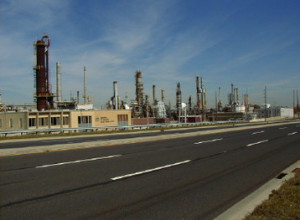Challenge
The City of Indianapolis was interested in evaluating the potential for redevelopment of the Marathon-Ashland (formerly Rock Island) Refinery in Indianapolis, Indiana. The refinery, operated since 1941, had refined and stored petroleum products on approximately 181 acres of land within a mixed industrial/commercial/ residential area in northwest Indianapolis. As such, the City asked that Mundell perform an evaluation of its historical operation and its environmental impact on adjacent land, surface waters and groundwaters. This impact was then to be used by Mundell to estimate demolition and cleanup costs for the facility.
Action
To accomplish this, Mundell personnel reviewed publicly available documents from the Marion County Health Department and the Indiana Department of Environmental Management to aid in the environmental characterization of the site. Based on either documented or potential impacts to the site from spills as indicated from analytical testing of soil and groundwater samples, Mundell reviewed the general past operational areas of the site, the subsurface geologic and hydrogeologic conditions, and estimated demolition and remediation costs using its own experience and that of others at refinery sites of similar size. The detailed assessment included an economic analysis of the activities necessary to return the property to a condition ready for a future multi-use function without impairments or constraints imposed by past refinery operations. To accomplish this, the site was broken down into five process and waste handling areas for specific evaluation.
Results
The evaluation and analyses indicated that from 1977 to 1992 alone, over 80,000 gallons of waste and slop oil, jet fuel, lubricants, gasoline, kerosene and industrial wastewaters were reported to have been spilled in multiple incidents. Of the liquids spilled, about 20 percent was reported to have been recovered. Receiving waters for the spills included adjacent Little Eagle, Oil, Crooked Gas, Fishback and Payne Creeks. Fish and fowl were reported killed by several of these incidents. A detailed review of RCRA violations since 1980 indicated a long history of regulatory non-compliance issues. The final analysis indicated a decommissioning and remediation cost range of from $9.8 to $12.3 million, depending on the level of unexpected contingencies required.




